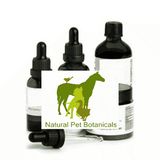A carefully selected blend of natural, plant and mineral ingredients, traditionally known for supporting symptoms of an Irritable Bowel Disease (disorder, or syndrome) are terms that describe a group of gastrointestinal disorders which display as inflammation of the lining (mucosa) of the digestive tract.
IBD can occur in the large intestine (colitis), the small intestine (enteritis), or the stomach (gastritis).
FOR FELINES
Is your cat has off and on diarrhea and vomiting then it sounds like IBS, rather than Gastro. If there is pain associated with it the Pancreas may also be involved or the main issue.
We recommend part of the Set below Bottle 1, 4, 5:
(we can email you a invoice you part of the set if you like)
1. Intestinal Recovery 83-1 formula
4. Activated Charcoal Powder (4 capsules)
5. Slippery Elm Powder 50mg
PLUS Recommending
UltraBiotic 500
Add to meals once a day for Canine and Feline
Super Strength, 14 Strain Probiotic
Serving Type: Powder. Available In Sizes: 14 sachets (70g), 7 sachets (35g)
UltraBiotic 500 is a combination of 14 probiotic strains providing 500 billion CFU per sachet. This high strength probiotic provides support for normal healthy digestive and immune system functions in a convenient one-a-day dose.
* Although this potent probiotic is pricey, it is worth, as we have not found any other probiotic that has work as well as this one for bowel inflammation and infection of humans and pets.
What is Triaditis in Cats?
“Triaditis” is not a singular illness, but a combination of three separate illnesses that frequently occur together. These three conditions are:
- Pancreatitis: It involved the inflammation of the pancreas.
- Cholangiohepatitis: It involved the inflammation of the gallbladder and bile ducts.
- Inflammatory Bowel Disease: It involved the inflammation of the stomach and intestines.
A vet may prescribed two types of drugs cortisone and ursodeoxycholic acid.
WARNING - if you 're pet is on Prednisone and other catabolic steroids injections or diuretics, are also well known to cause pancreatitis.
Therefore, we recommend using all natural for your cat of pancreatitis 72(A) Set
and/or IBS (83 IBS Set)
and/or Inflamed biliary duct of the Liver See 37(A) Set
Request 37(A) and 83 pdf HELP SHEETS as well.
If needing all three health support formulas.
If your pet has been on these drug for awhile, you can help clear and detox from by using the 110 Set of 2.
Request the 110 Pdf Help sheet to read about the side effects of cortisone and ursodeoxycholic acid as well.
Natural Pet Botanicals Recommendations formulas are both effective and gentle in supporting the whole body, you support your own animal or pet at home, and in almost every single case we improve vitality and longevity. If you are dealing with any metabolic or immune issue with your pet, we suggest that you contact us for a consultation so we can ensure you are using the right products.
* Natural pet botanicals are not intended to replace veterinary care or medication. Our formulas are offered as an alternative health support for your animal's condition and not as a cure. All our oral supplements are to be consumed voluntarily by your animal in food, treats or liquid.
SET OF 5
1. Intestinal Recovery 83-1 50ml
2. Intestinal Herbs 83-2 100ml
3. Pet Kalm Eze 4 30ml
4. Activate Charcoal powder *4 capsules
5. Slippery Elm powder 50gm
INGREDIENTS AND BENEFITS
Formula 1.
Club Moss (Lycopodium 30C, 5C) (traditionally used for abdominal bloating)
Mineral Phosphorus (Phosphorus 200C) (traditionally used for bloody painless and profuse diarrhea. Emotional oversensitivity to the feelings of others. Overexcited mind with fits of anxiety mainly when alone or in the evening; gets tired easily)
Balsam of Copaiva (Copaiva 12X) (traditionally used for mucous colitis)
Meadow Saffron (Colochicum 200C) (traditionally used for digestive aid and loose stools)
Golden Seal (Hydrastis 12X, 10M) (traditionally used for infection relief)
Bitter Apple (Colocynthis 5X, 12X, 30X, 200X) (traditionally used for cramping, jelly like stools)
Mineral Phosphorus (Phosphorus 200C)
Magnesia phosphate (Mag Phos 6C, 12X, 5M)
Ammon.Chloride (Merc Corr 1M) (traditionally used for blood in stools)
Charcoal (Carbo Veg 200X, 12X) (traditionally used for digestion aid)
Copper mineral (Cuprum Met 6C, 10M)(traditionally used for fast cramping, spasms)
Common Aloe (Aloe 30X, 200C, 10M) (traditionally used for mucous stools)
Chlorhydrate mineral (Histamine 5M) (traditionally used for allergies, colitis, headache, fever, shivering, asthma, bronchitis)
in 20% USP alc. in purified water.
Reference: https://pubmed.ncbi.nlm.nih.gov/32683037/
Reference: https://www.herbalgram.org/resources/herbalgram/issues/87/table-of-contents/herbalgram-87-herb-profile-aloe/
Formula 2.
Comfrey (Symphytum officinale)
Reference: https://www.researchgate.net/publication/221855881_Comfrey_A_Clinical_Overview
Chaga (Inonotus obliquus)
Reference: https://www.sciencedirect.com/science/article/pii/S2667142523001148
Blue Vervain (verbana hastata)
Reference: https://academicjournals.org/article/article1380878246_Akuodor%20et%20al.pdf
Licorice Root (Glycyrrhiza glabra)
Reference: http://cms.herbalgram.org/expandedE/Licoriceroot.html
Goldenseal (Hydrastis canadensis)
Reference: https://pubmed.ncbi.nlm.nih.gov/32683037/
Formula 3.
Oats (Avena Sat)
Hops (Hummulus Lupulus)
St. Ignatius Bean (Ignatia Amara)
Phosphate of Potassium (Kali Phos)
Passionflower (Passiflora)
Suma (Brazilian ginseng)
Valerian (Valeriana 200C)
in 20% USP alc. in purified water.
Reference: https://evidencelive.org/oat-straw-benefits/
Reference: http://cms.herbalgram.org/expandedE/Passionflowerherb.html
Reference: https://www.healthline.com/nutrition/valerian-root
Reference: http://cms.herbalgram.org/expandedE/Hops.html
4. Activated Charcoal Powder
May assist with clearing of over 3,000 toxins from the body in all species.
Reference: https://draxe.com/nutrition/activated-charcoal-uses/
5. Slippery Elm Bark (Ulmus rubra)
Slippery elm's inner bark and mucilage
Instructions on label
Irritable Bowel Disease
(disorder, or syndrome) are terms that describe a group of gastrointestinal disorders which display as inflammation of the lining (mucosa) of the digestive tract.
IBD can occur in the large intestine (colitis), the small intestine (enteritis), or the stomach (gastritis).
The most common symptoms of IBD are chronic vomiting and diarrhea, symptoms which can be present in a number of other conditions, such as hyperthyroidism, chronic renal failure, or pancreatitis.
In some cases, loss of apppetite accompanied by weight loss, may occur. These symptoms are also common in other conditions. Microscopically the disease is characterized by the infiltration of inflammatory cells into the lining (mucosa) of the digestive tract but the cause of IBD is unknown.
Slippery Elm Bark - In the gastro-intestinal tract, slippery elm acts directly. Its mucilage content coats, soothes, and lubricates the mucus membranes lining the digestive tract. Slippery Elm is an excellent treatment for ulcers, gastritis, colitis, and other inflammatory bowel problems. It is high in fiber, and so helps normalize intestinal action; it can be used to relieve both diarrhea and constipation. It may also help alleviate nausea and vomiting in pets suffering from non-GI illnesses, such as kidney disease.
VERY IMPORTANT - PROBIOTICS
Use the specific strain is called SB Saccharomyces boulasdii (5Bilion CFU By BioCeuticals SB Floractiv) take 2 caps twice a day or your pet add 1-2 powder from capsules - twice a day. A stronger is also available from AussiePooch - Saccharomyces Boulardii (SB) 20billion CFU (60 caps)
Twice a day for min of 2 months.
The “Clostridium difficile” bacterial gut infection is common for Lyme patients or Pets and Humans that have been on chemical antibiotics. Diff or C. difficile stands for “Clostridium difficile” which is a bacterium that infects the colon and can create symptoms of diarrhea, cramping, and inflammation.
In extreme cases, it can be life threatening. Unfortunately, people or pets who are on antibiotics are susceptible to getting this infection. Signs of a severe infection are watery stools more than 10 times a day, blood or pus in the stool, severe abdominal cramping and pain, fever, nausea, dehydration, loss of appetite, and weight loss1.
Often diagnosed as having Colitis or Diarreha.
Need more advice or have more questions? Contact us for a FREE consultation with one of our fully qualified practitioners.
FDA DISCLAIMER
The statements made regarding these products have not been evaluated by the Food and Drug Administration. The efficacy of these products has not been confirmed by FDA-approved research. These products are not intended to diagnose, treat, cure or prevent any disease. All information presented here is not meant as a substitute for or alternative to information from your health care practitioners. The Federal Food, Drug, and Cosmetic Act require this notice.

















